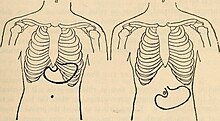| Gastroptosis | |
|---|---|
 | |
| Specialty | Gastroenterology |
| Risk factors | Female gender [1] |
| Diagnostic method | X-ray with barium contrast [1] |
Gastroptosis is the abnormal downward dislocation of the stomach in which its greater curve is displaced below the iliac crest. It is not a life-threatening condition.
The condition frequently causes digestive symptoms, epigastric pain, constipation, decreased appetite, and sometimes even gastric emptying disorders. [2] It is much more prominent in women than men, and is diagnosed with x-ray using barium contrast. [1] [3] Gastroptosis is mainly caused by the relaxation of surrounding ligaments and mesenteries as a result of the weight of the stomach. [4]
See also
References
- ^ a b c Kusano M, Moki F, Hosaka H, Shimoyama Y, Kawamura O, Nagoshi A, et al. (2011). "Gastroptosis is associated with less dyspepsia, rather than a cause of dyspepsia, in Japanese persons". Internal Medicine. 50 (7): 667–671. doi: 10.2169/internalmedicine.50.4582. PMID 21467696.
- ^ Staszewska A, Jarzumbek A, Saran A, Gierak-Firszt S, Kwiecien J (January 2023). "Postprandial Abdominal Pain Caused by Gastroptosis-A Case Report". Children. 10 (1): 116. doi: 10.3390/children10010116. PMC 9857050. PMID 36670666.
- ^ Gould GM (1899). The Philadelphia Monthly Medical Journal. Philadelphia Medical Publishing Company. p. 150. Retrieved 13 November 2017.
- ^ Bestari MB, Chandra M, Joewono IR, Girawan D, Andhika R, Wahyudi Y, et al. (2022). "Gastroptosis due to Gastric Outlet Obstruction Secondary to Duodenal Tumor: Glenard's Disease Revisited". Case Reports in Gastroenterology. 16 (1): 89–93. doi: 10.1159/000521977. PMC 8958574. PMID 35431764.